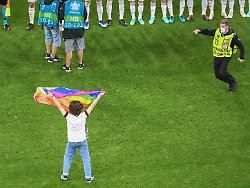The football world is currently bathed in rainbow colors. Has sport finally arrived in the 21st century? Hardly likely! The eager expressions of solidarity only mask the still homophobic structures of professional football.
Red, orange, yellow, green, blue, purple – these colors have arrived in professional football since Wednesday at the latest. At first glance, the sport seems more liberal than ever. With a raised index finger in the direction of Hungary, where the rights of LGBTQ people are undoubtedly being trampled on, German football dressed in waving rainbow flags can collect karma and social media points: Look how progressive, tolerant and diverse we are. But the hastily colorfully whitewashed facade can hardly cover the ailing interior of professional football. Because the Germans’ favorite sport is still essentially homophobic – and the problem is structural.
We are living in the year 2021, lesbian moderators, queer entrepreneurs, transsexual top models and homosexual politicians are part of the norm. Even in the reactionary right-wing populist AfD, a lesbian woman leads the parliamentary group in the Bundestag. And what about the professional footballers? A booming silence. There is still not a single active Bundesliga player who is openly gay – and only a few ex-professionals. The fact that there are no homosexual footballers is almost impossible. Statistically, 45 to 150 players in the Bundesliga would have to be gay, assuming that three to five percent of the total population are homosexual. But a look at women’s football is enough. There, lesbian and queer professionals and amateurs play together in teams as a matter of course. So why not with men?
There are obvious reasons. Nobody just wants to name them. Terrifying, but not surprising, writes Philipp Lahm in his new book, he advises active professionals against coming out as homosexual. The book came out this year. Before him, other ex-professionals such as Lothar Matthäus or Günter Netzer had already made similar statements. If a player is considering a coming-out, Lahm writes in “Das Spiel”, he would “not even advise him to talk to his teammates in his own club about this topic”.
Apparently, someone in football has allegedly not been ready for openly gay men for decades. The team? The Union? The national team? Or is it the fans? The attempt to pass one’s own failures on to the latter is particularly despicable. After all, nobody knows from experience how fans would behave towards gay football professionals on the pitch. And there are now several progressive ultra groups and gay fan clubs.
Homosexuality is “simply ignored”
But it is also a fact: football is the last great male bastion. Homosexuality is “simply ignored,” said former national player Thomas Hitzlsperger. He was the first prominent German ex-soccer player to make his homosexuality public in 2014. Today, after all, they want to show solidarity with the outside world. But isn’t it very easy to put on an armband or light up a stadium? It doesn’t hurt anyone. Just putting a symbol, however honorable that may be, is simply not enough. Because afterwards everyone leans back satisfied, pats each other on the shoulder and goes back to business. The real problem remains unsolved.
However, there is no shortage of attempts. At the beginning of the year, the DFB set an example at the association level and launched the “Contact Point for Sexual and Gender Diversity”. A little later, more than 800 German footballers pledged their support for homosexual players with a sensational appeal. “You can count on us!” went through the media and was widely shared on social networks. However, it has achieved little. That may be due to the demarcation from those affected. “You” inevitably implies that the professional with the sign in hand is not homosexual. Perhaps an action à la Alice Schwarzer in 1971 with “We have aborted” would be much more successful. Just imagine a big magazine putting 25 football professionals on the front page who say: “We are gay”.
But for such a self-confident statement, football professionals would have to grow up differently: So far, they have been trained physically and mentally for success from early childhood on. And later treated like precious goods, where each misstep costs millions. Professional football only rewards those who have made it to the top according to its conception. A men’s vision in which a strong right adhesive is just as important as a smooth image and a pretty player woman on the side.
Instead, associations and clubs should include not only contact points on the subject of homophobia but also mandatory workshops in their trainer training. Referees would have to be called to interrupt the game even if they were called homophobic or sexist. And the Bundesliga clubs could also show a gay couple on their club magazines. As long as that doesn’t happen, the rainbow flags in the stadium are cheap and only serve to improve the image.
.
